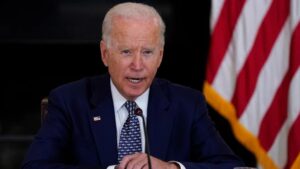A Progressive Wave in the Senate: After a series of conservative Supreme Court rulings at the start of summer, the Democratic-controlled Senate quickly confirmed a diverse slate of judicial nominees. These law-trained progressive nominees contrasted with the Court’s recent decisions.
California labor lawyer Casey Pitts successfully defended a Seattle pro-union law. The Senate confirmed Pitts two weeks after the Supreme Court weakened federal protections for striking workers. Natasha Merle, a civil rights attorney and former public defender, secured Brooklyn’s federal court confirmation after the high court’s ruling made certain post-conviction challenges more difficult.
Nearly a year after the Supreme Court overturned the constitutional right to abortion, another significant confirmation occurred. The Senate confirmed reproductive rights lawyer Julie Rikelman for a Boston-based federal appeals court.
These judges fulfill President Joe Biden’s and Democratic lawmakers’ promises to diversify the bench. Senator Raphael Warnock noted that while individuals from large corporate firms could be excellent US Attorneys or judges, it is heartening to have people with different viewpoints, especially from the civil and human rights activist community.
Years of efforts to expand the pipeline for judicial nominees led to the Senate’s recent confirmation spree and the Supreme Court’s trajectory. Senate traditions, the absence of key lawmakers, and GOP support caused problems. Senator Dianne Feinstein’s return and the Democrats’ ability to get the votes resolved these issues, revitalizing the confirmation process.
In the past week, the Senate confirmed Tiffany Cartwright, who sues law enforcement for wrongful deaths, and Kymberly Evanson, who challenged the Trump travel ban for the ACLU of Washington. Former state court judge Myong Joun, an employment and criminal defense lawyer, was also confirmed.


READ MORE: Manchin New Hampshire Trip: Democrats on Edge Amid Third-Party Speculation
Dale Ho and Nusrat Choudhury, President Biden’s nominees, have civil rights backgrounds. This change shows a concerted effort to diversify the judiciary and broaden judgeship nominees.
Biden’s incoming White House Counsel, Dana Remus, wrote a letter urging federal bench nominations of historically underrepresented lawyers. Some delegations created or revamped selection commissions to recommend diverse candidates.
Senate traditions like blue slips for district court judges limit Biden’s influence on the judiciary, but his focus on diversity will affect confirmed nominees’ states. Senate Democrats can also advance appeals court nominees without blue slips for circuit court nominees. Rachel Bloomekatz, an environmental and voting rights attorney, and Nancy Abdu, a civil rights litigator, illustrate this trend.
These nominees shape the law, other courts, and their jurisdictions. Biden’s commitment to judicial diversity is paving the way for a more inclusive legal system, despite Senate procedures and partisan opposition.
Also Read: Twitter Africa Staff Left Stranded: No Severance Pay or Benefits
Our Reader’s Queries
Who are the progressives in Congress?
Jared Huffman represents San Rafael in California’s 2nd district. John Garamendi serves Walnut Grove in the 8th district. Mark DeSaulnier represents Concord in the 10th district. Barbara Lee is the representative for Oakland in the 12th district. Ro Khanna represents Fremont in the 17th district. Zoe Lofgren serves San Jose in the 18th district. Jimmy Panetta represents Carmel Valley in the 19th district. Judy Chu is the representative for El Monte in the 28th district.
What issue did progressives have with the appointment of senators?
Progressive reformers rejected the idea of politicians elected by these legislatures as mere puppets, and saw the Senate as a “millionaire’s club” catering to wealthy private interests.
What is a progressive political?
Progressivism in the United States is a political ideology and movement for change. In the 21st century, it promotes policies that are often seen as more socially democratic and aligned with the American Left. It has also been seen in right-wing politics, like New Nationalism and progressive conservatism.
Why was the election of 1932 significant?
Franklin Roosevelt broke an 80-year streak for Democrats, winning the presidency with a majority vote on November 8, 1932. In the House, Democrats gained a whopping 97 seats, giving them a three-to-one advantage over the Republicans on Capitol Hill.

